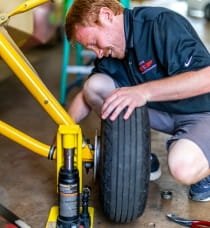zeitgeist
/ˈzʌɪtɡʌɪst/ – noun
– The defining spirit or mood of a particular period of history as shown by the ideas and beliefs of the time. “The story captured the zeitgeist of the late 1960s”
Starting this post with a quote:
“If somebody offers you an amazing opportunity but you are not sure you can do it, say yes – then learn how to do it later!”
Richard Branson
This “wisdom,” attributed to Richard Branson (Wiki link), is often quoted on the LinkedIn social network – as an encouragement to people who are uncertain of whether they should apply for a job they are not (yet) competent for.
Yes, some job requirements, at least in Serbia, are filled with stuff that is not really necessary, or reasonable to expect from a person applying for the position (i.e. unrealistic demands). And many things can be learned “on the fly”. So what is this whole writing about? Here’s a nice picture:

Sure, the picture above is made for style, not function, but I’ll use it to make a point:
Notice how the wrench is oriented in the wrong way – it is more likely to scratch some paint while being turned (even if the mechanic finds a bolt that fits the wrench… or is it the other way around?).
Would it be easier to stand on the other side of the motorbike – the one you are doing the work on?
Would that be safer – both for the mechanic, the machine, and in terms of ensuring nothing is missed?
Of course, nobody is born knowing everything. That is what apprentice positions and jobs are for, regardless of your chosen career path. But what if you apply for a job you are not competent for (not for apprenticeship), “faking” that you are? Well, let’s discuss that a bit.
First of all, by applying for a job you are not competent for, you are likely wasting everyone’s time. A competent employer would test you, and see how good you are. Sure – you might get some experience with doing interviews, or tests (provided you get to that phase). It would be fair to say that in that case, you are only wasting the employer’s time, not your own, not completely. 🙂
On the other hand, if, by any chance, you get the job – what does it say about the competence of the employer? Do you want to be working in a company that hires incompetent people? Are your colleagues also chosen like that?
Imagine you get to fix the brakes on a car someone will take their kids for a ride in. Should you have the required knowledge and experience, or just learn as you go?
Or if you apply for a less “serious” job of a manager, or at sales: if you don’t know how to do your job, the above-noted mechanic, even if they are competent, could be in trouble, having their job tougher, or losing it, if the company doesn’t do well, thanks to poor management, or not making enough sales.
However, I see this fairly often these days. It is scary. Hopefully, companies employing pilots do a bit more thorough candidate checks, but many companies are started by “fake it ’till you make it” entrepreneurs, who hire “fake it ’till you make it, just go for it” people, and then go on to offer services or products. Whole industries and economies are run that way.
Apparently, it’s great for making money. It works. It’s widely spread in the software development business for one. Things are made, not tested thoroughly enough, but it holds water for a while, until the next job, while someone else will figure out how to fix them, or swap for a different software… somehow. It’s not much better in the cycling industry either – just check out the ThanksShimano Instagram account (Shimano is far from the worst, or the only company making unsafe products, I just used it as a well-known brand example).
It’s Zeitgeist – the spirit of the current times. Things change so quickly, that it’s not profitable to get very proficient in almost any field of expertise – because the knowledge (and experience) gets obsolete too fast. Sometimes (in the world of software) within a year, or two. It is more reasonable to just learn as little as necessary to get things “patched”, for as long as you are at a job/technology, then move on to the next thing that pays well. Learning as you go.
As I said: many managers/employers are incompetent, hiring similarly “competent” HR and sales, who often aren’t able to find (and/or keep) competent employees. “Luckily”, most of the customers are equally clueless, and can’t tell good quality from the subpar one, just falling for marketing, labels and brands (case in point, my video on why modern bicycle frames suck?).
Another thing, related to the above noted:
in spite of having the entire human knowledge at one’s fingertips, provided by the Internet, most people spend time on Instagram, or TikTok, with the average attention span going below 10 seconds (now where did I lose the source of that info?). Hence, probably the best way is to just go with the flow.
Still here? Well, your patience and tenacity must be way above the average. Not being sarcastic here. Anyway, before wrapping this up, here’s another quote:
“If you can walk away from a landing, it’s a good landing. If you use the airplane the next day, it’s an outstanding landing.”
Chuck Yeager (Wiki link)
This brings us to the end of this rant. 🙂 Remember:
Never let your lack of competence stop you!
…Just… please, don’t blame manufacturers, or mechanics, if your car brakes stop working when you need them – they too are living the modern life – enjoy it while you can.
If you enjoyed this post:
Share & SubscribeSeek professional medical help- You might find my article on industry problems and AI risks interesting. It’s on my website, which is about cycling, but the article covers a broader topic.

